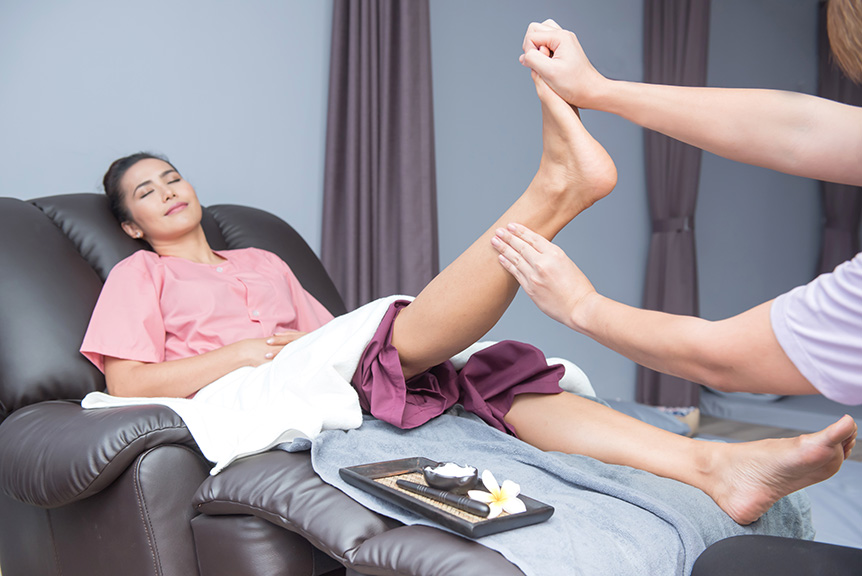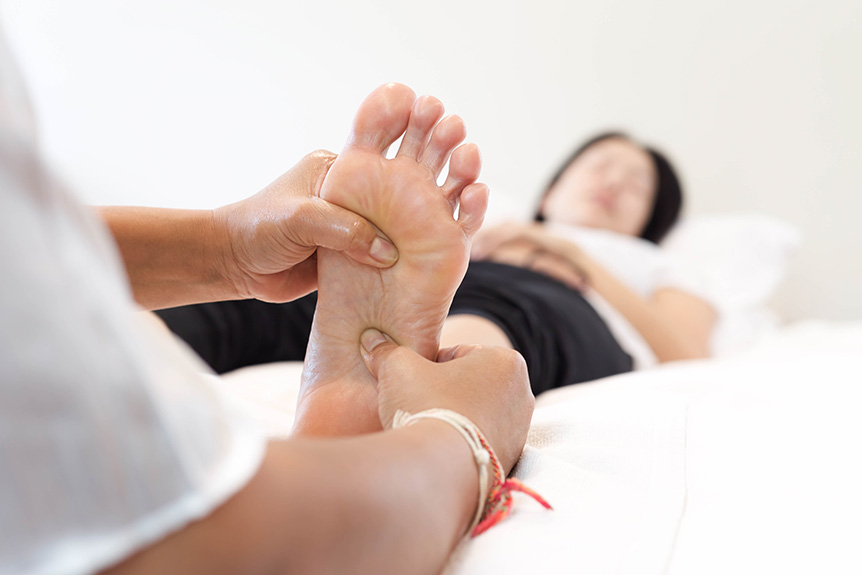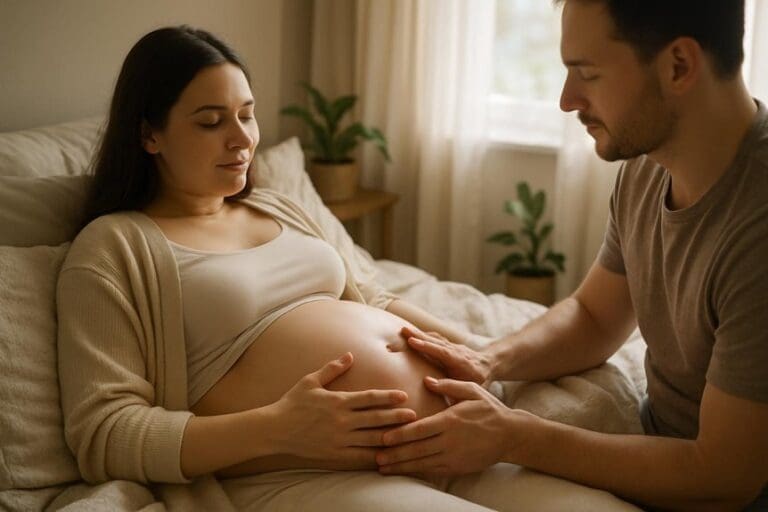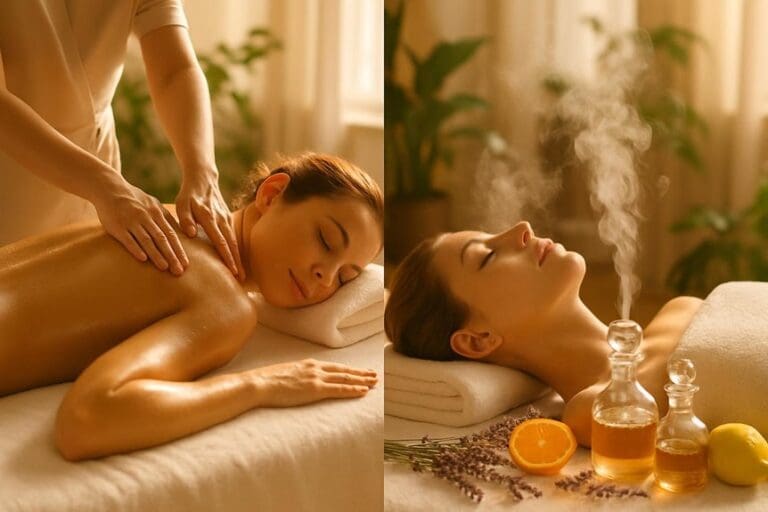It does not increase the chance of pregnancy. It is a supportive therapy that may reduce stress, improve sleep, and ease discomfort during fertility journeys. Evidence is limited and methodologically weak, with studies focusing on relaxation rather than conception rates. Any effects on hormones or cycle regularity are indirect, via stress modulation and better rest. It can be safely integrated alongside IVF with appropriate screening and gentle techniques. Certain conditions require caution or avoidance. More context clarifies benefits, limits, and safe use.
What It Is and How It Relates to Fertility

It is a manual therapy applying targeted pressure to mapped points on the feet, hands, or ears thought to correspond with organ systems via neural and circulatory pathways.
From Spa & Massage’s perspective, it is positioned as supportive care—not a fertility treatment.
In clinic, therapists focus on relaxation, down‑regulation of stress responses, and relief of musculoskeletal tension that may accompany trying to conceive.
Potential relevance to fertility is indirect: improved sleep quality, reduced perceived stress, and enhanced body awareness can support regular routines, intimacy, and adherence to medical plans.
Therapists avoid claims of hormonal regulation or cycle correction.
Sessions are tailored to comfort, with gentle pacing, clear consent, and aftercare emphasizing hydration, rest, and coordination with one’s healthcare provider.
Proponents highlight that regular massage sessions may allow clients to experience the healing power of reflex therapy as part of a holistic approach to well-being during fertility journeys.
The Science: What Research Says About Reflexology and Conception
Current research on this therapy and conception is limited by small sample sizes, heterogeneous protocols, and a lack of robust controls, so causal claims remain unproven.
However, studies consistently suggest potential indirect benefits—such as reductions in stress, anxiety, and pain—that may support overall wellbeing during preconception.
From Spa & Massage’s perspective, it is best positioned as an adjunct to evidence-based medical care, with expectations set around comfort, relaxation, and stress modulation rather than guaranteed fertility outcomes.
Evidence Quality and Limits
While zone therapy is frequently explored as a supportive therapy for those trying to conceive, the evidence base remains limited and methodologically mixed.
Small trials and observational studies often report relaxation and symptom relief, yet most lack adequate randomisation, blinding, sham controls, and predefined fertility endpoints (e.g., live birth).
Sample sizes are typically underpowered, outcome measures vary, and placebo effects are difficult to exclude. Publication bias further clouds interpretation.
From Spa & Massage’s clinical perspective, it should be framed as complementary, not fertility-enhancing in its own right.
When clients in London ask about evidence, therapists emphasise transparency: it may help with comfort and stress regulation, but claims of improved conception rates exceed current data.
Ethical practice involves clear consent, careful note-taking, and coordination with medical care for diagnosis and fertility planning.
Potential Indirect Benefits
A cautious reading of the literature suggests it may confer indirect benefits relevant to conception by attenuating stress, improving sleep quality, and modulating perceived pain and anxiety—factors linked to reproductive hormones and cycle regularity. Small randomized and observational studies report reductions in state anxiety and improved sleep parameters, with plausible downstream effects on cortisol and sympathetic tone.
These outcomes may ease preconception distress, though causality for increased pregnancy rates remains unproven.
From Spa & Massage’s perspective, such gains matter. In our London clinics, therapists deliver reflex therapy within a calm setting, prioritising gentle pressure, paced breathing, and consistent session timing to support relaxation and sleep hygiene.
Clients often pair this therapy with aromatherapy or pregnancy-safe massage (when appropriate). The recommendation is pragmatic: consider it as an adjunct to medical fertility care, not a substitute.
Potential Benefits for Hormonal Balance, Stress, and Cycle Regularity
Though definitive conclusions remain limited, emerging evidence suggests zone therapy may help modulate stress responses and indirectly support hormonal balance and cycle regularity.
Small randomized and observational studies report reductions in perceived stress and anxiety, plausibly via parasympathetic activation and lowered cortisol. In turn, improved sleep and relaxation may lessen hypothalamic–pituitary–adrenal interference with reproductive hormones, with some individuals noting steadier cycles and fewer premenstrual symptoms.
From Spa & Massage’s clinical perspective, such benefits are considered adjunctive. It should sit alongside medical care, lifestyle foundations, and cycle-aware habits.
In our London clinics, therapists emphasise gentle, consistent sessions, clear goals, and careful tracking of symptoms and cycle length.
Clients are encouraged to pair sessions with regular sleep, nutrition that stabilises energy, and stress-management routines to support hormonally friendly rhythms.
How a Fertility-Focused Reflex Therapy Session Works at Spa & Massage

Because fertility is influenced by multiple factors, a fertility-focused reflex therapy session at Spa & Massage is structured as a supportive, adjunctive intervention rather than a standalone treatment.
Therapists begin with a brief health review—cycle patterns, stress load, sleep, and any medical care—then explain that it does not induce ovulation or treat infertility, but may ease stress and support relaxation.
During the 45–60 minute session, targeted pressure is applied to mapped reflex points on feet and hands associated with the hypothalamic–pituitary–ovarian axis, adrenal function, pelvis, and diaphragm. Pressure is firm yet comfortable, paced to invite calm breathing and parasympathetic tone.
Sequences are adjusted across the follicular, ovulatory, and luteal phases.
Afterward, therapists offer practical aftercare—hydration, gentle movement, and sleep hygiene—plus scheduling guidance aligned with cycle timing.
Safety Considerations and When to Avoid Zone Therapy
Fertility-focused reflex therapy at Spa & Massage is positioned as supportive care, not a treatment for infertility; the same caution applies to safety. Evidence for it’s effect on conception is limited, so prudence matters.
Clients should avoid sessions with suspected or confirmed deep vein thrombosis, active infection, uncontrolled hypertension, severe varicose veins, recent foot or ankle injury, or unexplained vaginal bleeding. Those with clotting disorders, neuropathy, or complex endocrine conditions should seek medical clearance.
During a potential early pregnancy, gentler pressure and shorter sessions are advisable; any cramping, dizziness, or pain warrants stopping. Spa & Massage therapists adapt pressure, avoid inflamed areas, and note medication use, cycle phase, and prior miscarriages.
Fragrance-free oils are available for sensitivity. Consent, comfort, and clear communication guide every session.
Integrating This Therapy With Medical Fertility Treatments
While many clients pursue IVF or ovulation induction, it can be positioned as adjunctive support aimed at stress regulation and comfort rather than altering clinical outcomes.
Evidence does not show that it improves implantation, egg quality, or live-birth rates. However, reductions in anxiety, perceived stress, and muscle tension are plausible and clinically meaningful during demanding treatment cycles.
At Spa & Massage clinics in London, therapists liaise with clients to respect medical protocols—avoiding contraindicated pressure, heavy stimulation around transfer windows, and any claims of efficacy on fertility parameters.
Sessions emphasise gentle foot work, paced breathing, and quiet, low-light settings to stabilise nervous-system arousal.
Clients are advised to inform their fertility team, disclose medications and procedures, and prioritise rest, hydration, and symptom monitoring between appointments, maintaining medical care as the primary pathway.
What to Expect: Timeline, Frequency, and Aftercare Tips
Although individual responses vary, most clients can expect a conservative, structured plan: an initial assessment to review pregnancy stage, medical history, symptoms, and goals.
A shorter trial session (30–45 minutes) is recommended to gauge tolerance. Then, there should be a cadence of weekly or fortnightly reflex therapy during the second trimester, tapering to every 2–3 weeks in late third trimester unless symptoms warrant more frequent care.
Evidence remains mixed; goals should focus on relaxation, symptom relief, and sleep quality rather than guaranteed fertility outcomes.
Sessions at Spa & Massage emphasise gentle pressure mapping, side‑lying positioning, and fragrance‑free or hypoallergenic oils unless otherwise requested.
Aftercare is simple: hydrate, avoid heavy exertion for 12–24 hours, and note any changes in swelling, cramps, or headaches.
Clients are advised to report red‑flag symptoms to their midwife or GP promptly.
Choosing a Qualified Reflexologist and Booking at Our London Clinics
Selecting a reflexologist for pregnancy care should focus on verified credentials, specific training in maternity reflex therapy, and clear protocols for consent and contraindication screening.
Spa & Massage operates within strict hygiene and safety standards—single‑use linens where appropriate, sanitised equipment, and therapists trained to modify pressure and positioning for each trimester.
For convenience, appointments can be booked across our London clinics in Crouch End, Bayswater, Chiswick, Earl’s Court, Belsize Park, and Richmond, with real‑time availability and notes for any obstetric considerations.
Credentials and Training
Because it is often sought during pregnancy, practitioner credentials matter. Evidence for fertility benefits is limited, so training and scope of practice help assure realistic expectations and safe care. A qualified reflexologist should hold a recognised diploma in reflex therapy, documented hours of supervised clinical practice, and current professional insurance.
Additional training in pregnancy care and clear referral pathways to medical providers are prudent.
At Spa & Massage, therapists offering this therapy complete accredited qualifications, ongoing CPD, and case-based supervision. They document goals, adapt pressure thoughtfully, and avoid unsupported claims about conception. Clients are encouraged to ask about certification, years in practice, and how progress is evaluated.
Booking is available across our London clinics—Crouch End, Bayswater, Chiswick, Earl’s Court, Belsize Park, and Richmond—with transparent therapist profiles and appointment times.
Safety and Hygiene
How can pregnant clients assess safety and hygiene standards when considering zone therapy? They can ask about infection-control protocols, cleaning schedules, and product ingredients. Clinically, high-touch surfaces should be disinfected between clients, linens changed each session, and hand hygiene performed before and after treatment. Instruments (if used) must be single-use or sterilised.
A pregnancy-aware intake form, consent process, and documentation of contraindications (e.g., pre-eclampsia, DVT, unexplained bleeding) indicate rigor.
At Spa & Massage, therapists trained in maternity care conduct pre-session screening, clean treatment rooms between appointments, and use fresh linens and individually dispensed oils.
Alcohol gel is available; gloves are used when skin integrity is compromised. Pressure is moderated around known pregnancy-sensitive reflex points.
Clients may request therapist handwashing on entry and visible wipe-downs of chairs, stools, and equipment for added reassurance.
Booking and Availability
Balancing convenience with clinical standards, Spa & Massage advises pregnant clients to prioritise practitioner credentials, screening processes, and appointment flexibility when arranging a session. They recommend verifying that therapists hold recognised qualifications in this therapy and pregnancy adaptations, maintain up‑to‑date insurance, and follow contraindication checks at every visit.
Clear consent, communication about fertility goals, and realistic expectations are essential; evidence for zone therapy enhancing conception is limited, though many report relaxation and symptom relief.
At Spa & Massage’s London clinics—Crouch End, Bayswater, Chiswick, Earl’s Court, Belsize Park, and Richmond—booking is straightforward: online scheduling, same‑day options when available, and discreet support for partner sessions.
Clients complete a pregnancy and medical questionnaire; high‑risk flags trigger referral or modification. Evening and weekend appointments accommodate treatment pacing, cycle tracking, and rest.
Conclusion
In sum, reflex therapy is no magic key but may oil the hinges: evidence suggests benefits for stress reduction, relaxation, and perceived wellbeing, with plausible indirect effects on hormonal balance and cycle regularity. It should complement, not replace, medical evaluation and fertility care. With qualified practitioners—such as those at Spa & Massage—clients can expect structured, safety-conscious sessions, clear aftercare, and integration alongside IVF or timed intercourse. Informed expectations, consistency, and collaboration with clinicians remain the most prudent path.



